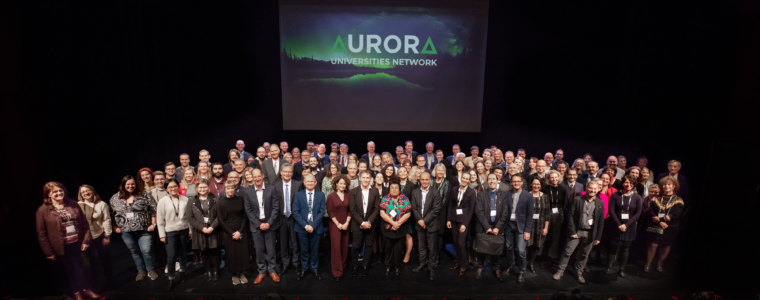12/11/2021
Representatives from eleven European universities are at the URV to discuss the competencies of the graduate of the future
More than 120 members of the leadership teams, researchers, administrative and service staff and students will meet at the URV in one of the two annual meetings of the Aurora consortium. Previously, a group of 30 university students will take part in a session to define how a meaningful international experience can be guaranteed for all Aurora students

More than 120 members of the leadership teams, researchers, administrative and service staff and students will meet at the URV in one of the two annual meetings of the Aurora consortium. Previously, a group of 30 university students will take part in a session to define how a meaningful international experience can be guaranteed for all Aurora students
Training a new generation of Europeans capable of cooperating across borders, disciplines and languages, who are innovative and prepared to face the social challenges that lie ahead: this is one of the main objectives of the Aurora network and one of the main focuses of the meeting at the Universitat Rovira i Virgili (URV) this coming Tuesday and Wednesday, the first face-to-face conference since 2019. Over two days, more than 120 representatives of the URV and ten other European universities that are part of the consortium will meet: Vrije Universiteit Amsterdam (Netherlands); Háskóli Íslands (Iceland); Universität Duisburg-Essen (Germany); University of Innsbruck (Austria); University of Naples Federico II (Italy); Palackého University v Olomouci (Czech Republic); Handelshøjskolen in København (Denmark); University of East Anglia (UK); the University of Aberdeen (Scotland) and Grenoble (France). Together they have about 300,000 students and 31,000 teachers, research, technical and administrative staff.
These European universities aim to form a transnational multi-campus that must propose solutions to new social and environmental challenges through research, teaching and dissemination. Therefore, it will initially combine programs and disciplines based on four main axes: Sustainability and Climate Change; Digital Society and Global Citizenship; Health and Well-being; and Culture: Diversity and Identity. This work has already begun with the teaching of subjects and courses between the different universities and also with the implementation of Aurora mobility for students, teaching and research staff and the administrative staff. The goal is for half of the students to be able to have an Aurora international experience while pursuing their studies.
Student meeting over the weekend
As an activity prior to the celebration of the Aurora Biannual, from this Saturday and until Monday at noon, 30 students from the different universities in the network will gather at Campus Catalunya to participate in the Aurora Design Thinking Jam. For two and a half days, they will take part in very intensive work sessions in order to define what a relevant internationalization experience should be like. They will look for answers to the question: What can universities do to ensure that every Aurora student has at least one international experience as part of their studies? The results of this task will be presented on Tuesday morning, during the celebration of the Biannual.
A European multi-campus
Aurora is a multi-campus project in Europe that began in 2016 with the creation of the consortium. In 2020, within the framework of the Erasmus + program, the European Commission (EC) chose the project as one of the 41 alliances of the “European Universities” initiative that will be created in the European Union. The first stage of the project runs until 2024. This program aims to allow students to obtain a degree combining studies in several countries while helping to promote the international competitiveness of the universities that are part of the initiative.
This European consortium aims to expand the offer of studies and internships within a network of nine partner universities and, in the first phase 2020-2023, will focus on the offer by creating four transversal strategic areas of Aurora (Sustainability and Climate Change , Digital Society and Global Citizenship, Health and Welfare, Culture: Diversity and Identity), in addition to promoting the main objective of the project, to encourage entrepreneurship and social innovation, as well as service research and learning. A virtual campus is being created, through which network students can enroll in courses and subjects at any university in the network, receive their assessment results directly, and be accredited without going through a validation process.
During the two days of the biannual meeting, plenary sessions will be organized to address key issues, such as the internationalization of the curriculum and the creation of a virtual campus, through which Aurora students will be able to enroll directly in subjects available within of the network. The other important issue is the completion of the Aurora competency framework, which will detail the additional soft skills that the labour market will expect to find in future graduates. Parallel work sessions of the specific work packages will also be held. Most of these meetings will take place in the Paranimf at the Rectorate.
More information: aurora.urv.cat/biannual
